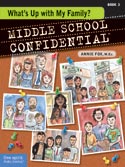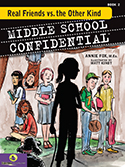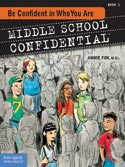October 2007
Halloween and the Art of Faking It
by Annie Fox, M.Ed

A week before Labor Day I trekked to the nearest megabox store where you can buy a bottle of ketchup that lasts two lifetimes. Since my current ketchup and I just celebrated our 5th anniversary, I’m still good, but we needed other things so a Costco run was in order. Forty minutes and eight free samples later I pressed toward the checkout and passed a crowd swarming around a rack of Halloween costumes. You heard me… it’s August and these parents and kids are acting like they have maybe 10 minutes to grab a costume and hit the streets. Of course that’s exactly what retailers expect when they jump the gun on the seasons. April shopper spots holiday merchandize. Shopper freaks. “Omigosh! I haven’t bought my summer solstice decorations! Gotta get on it… NOW!”
 Don’t get me wrong. I love holidays and for me Halloween is right up there with Millard
Fillmore’s Birthday (January 7th). No, seriously, Halloween rocks. Our kids don’t even live here any
more and David and I still stroll the neighborhood to check out the trick-or-treaters. We usually don’t ring
doorbells, though we have a neighbor who’ll give you a draft beer if you tell him a joke, so there’s that.
Sometimes I dress up as a mime. David usually wears his “I’m a multi-media producer” costume — subtle,
but totally convincing.
Don’t get me wrong. I love holidays and for me Halloween is right up there with Millard
Fillmore’s Birthday (January 7th). No, seriously, Halloween rocks. Our kids don’t even live here any
more and David and I still stroll the neighborhood to check out the trick-or-treaters. We usually don’t ring
doorbells, though we have a neighbor who’ll give you a draft beer if you tell him a joke, so there’s that.
Sometimes I dress up as a mime. David usually wears his “I’m a multi-media producer” costume — subtle,
but totally convincing.
Halloween aside, my senior year in high school I was voted Class Actress, so I understand the fascination with pretending to be someone else. And I’ve been investigating the daily masquerades played by students across the country. I’m talking about faking it… or as I defined it in my recent online teen survey: Doing or saying something just to impress other people OR holding yourself back just so others won’t give you a hard time.
Here’s how kids answered this question: “How do you know when you’re faking it?”
 “I have a feeling of guilt and hatred for myself. I feel like I’m a wimp for
not speaking the truth.”
“I have a feeling of guilt and hatred for myself. I feel like I’m a wimp for
not speaking the truth.”- “It’s hard for me to really shine thru and show people who I am because I am always worried about impressing them. I hate it when I act this way.”
- “I feel like a fraud in my own body. I feel betrayed by myself because I’m not showing everyone who I am and it hurts because I don’t know if they will like me for who I am.”
- “I get a nagging feeling tugging at the back of my brain, telling me ‘Don’t do this, you know this isn’t you.’”
- “Whenever I’m putting on ‘my mask,’ I feel sort of terrible and messy inside, like a lot of spaghetti, all tangled up. I feel almost sick to my stomach and a little anxious, but I still do it to impress others. But it never feels quite right. I do it because I feel like I’m not good enough sometimes.”
Of course all kids don’t experience self-censoring all the time, but many feel forced to do it way too often. For our kids, on some level everyday at school is Halloween, except without the candy.
The farther we travel from our own middle school hell, the harder it is to understand why our kids consciously choose not to be their own person. I’ll tell you what they’ve been telling me for years: They do it because they’re scared not to.
What do they fear most? Not fitting in, of course. Being excluded, mocked, ignored by their peers. Fear is an intense motivator and it compels many teens to conform, to hold themselves back, and to callously jettison any friends who aren’t cool enough in spite of how “fraudulent” and “messy” it makes them feel. They do it because in most schools, being different spells S-O-C-I-A-L D-E-A-T-H.
Reading their honest responses saddened me. Maybe you felt that way too. I just want to help them not be afraid so that they can relax, grow up in healthy ways, and yes, have more fun. Fun’s a good thing but you can’t have fun when you’re scared to make a move without first checking out what everyone else is doing.
How can we help tweens and teens build the resilience and strength of character they need to resist peer approval addiction? (PAA = worrying so much about what other people think that you abandon your values and your sense of self.)
Should we encourage them to do whatever they want whenever they want? Should we reward them for never modifying their behavior to accommodate the needs of others or the situation? I wouldn’t recommend it. Compromise and flexibility are keys to mental health and success. As adults we know there are times we need to hold our tongues, or restrain ourselves from sending that email rant. There are also times when, in spite of any fear of reprisals, we have to do what we know is right. That’s leadership.
Teens with leadership skills excel. We can help them develop those skills by talking about times when a family member (ancestor, parent, the teen herself) did the right thing despite danger or risk. The magnitude of the act isn’t as important as the impulse to do the right thing. Everyone has had these moments and talking about them reinforces the truth that ordinary people just like us have the courage it takes to overcome fear.
When I asked kids, “How would your life be different if you didn’t have to worry what other people think?” here’s what they said:
 “I’d probably share with people that ‘Hey, being yourself is cool, and if you can’t
do this now... why not?’”
“I’d probably share with people that ‘Hey, being yourself is cool, and if you can’t
do this now... why not?’”- “I would not spend a lot of money or do stupid things just to fit in.”
- “I would try out for football with the boys.”
- “I’d go to school in costume every day, dressed as a medieval knight, an astronaut, a soldier, or something totally new!”
- “I wouldn’t formulate the perfect words to say to those perfect people. I would say exactly how I feel.”
- “I would eat a cheesecake and wear a flannel vest. Woah! That would be a pretty darn cool world!”
- “I would love it! It would be like a freedom that lets you fly and soar.”
 We all say that we want our kids to be happy. Happiness comes from a strong sense of
self. Sometimes our thoughtful words will encourage teens to fight against peer approval addiction
and quit hiding behind a mask. Sometimes we’ll be more helpful just by listening compassionately.
I’ve got no tip-sheet for you, just a provocative question: What could you do today and on an ongoing basis
to help your son or daughter “fly and soar?”
We all say that we want our kids to be happy. Happiness comes from a strong sense of
self. Sometimes our thoughtful words will encourage teens to fight against peer approval addiction
and quit hiding behind a mask. Sometimes we’ll be more helpful just by listening compassionately.
I’ve got no tip-sheet for you, just a provocative question: What could you do today and on an ongoing basis
to help your son or daughter “fly and soar?”
In friendship,
Annie
















